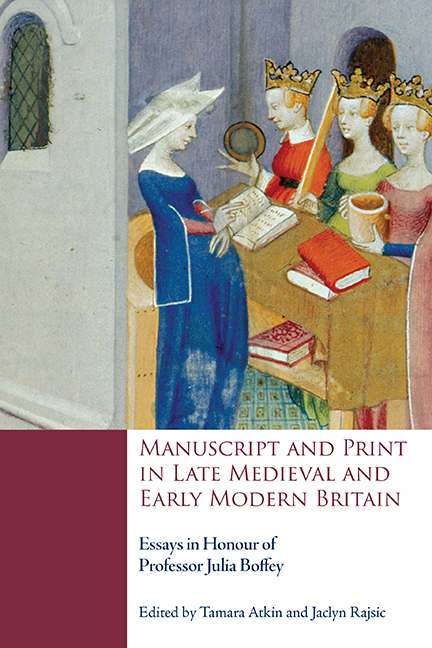 Manuscript and Print in Late Medieval and Early Modern Britain
Manuscript and Print in Late Medieval and Early Modern Britain Book contents
- Frontmatter
- Contents
- List of Illustrations
- List of Contributors
- Acknowledgements
- List of Abbreviations
- Introduction
- PRODUCING TEXTS
- 1 Gower's ‘Epistle to Archbishop Arundel’: The Evidence of Oxford, All Souls College, MS 98
- 2 From Oxford to Eton with Master John Maunshull: Teaching the Tria sunt in Bodleian Library MS Laud misc. 707
- 3 Gavin Douglas, Aesthetic Organization and Individual Distraction
- 4 Gavin Douglas's Eneados: The 1553 Edition and its Early Owners and Readers
- 5 Caxton and the Crown: The Evidence from the Exchequer of Receipt Reconsidered
- 6 Late Medieval Books of Hours and Their Early Tudor Readers In and Around London
- 7 London, British Library, MS Harley 367 and the Antiquarian Ideals of John Stow
- READING INFLUENCE
- Afterword
- Julia Boffey: A Bibliography
- Manuscript Index
- General Index
- Tabula Gratulatoria
7 - London, British Library, MS Harley 367 and the Antiquarian Ideals of John Stow
from PRODUCING TEXTS
Published online by Cambridge University Press: 06 September 2019
- Frontmatter
- Contents
- List of Illustrations
- List of Contributors
- Acknowledgements
- List of Abbreviations
- Introduction
- PRODUCING TEXTS
- 1 Gower's ‘Epistle to Archbishop Arundel’: The Evidence of Oxford, All Souls College, MS 98
- 2 From Oxford to Eton with Master John Maunshull: Teaching the Tria sunt in Bodleian Library MS Laud misc. 707
- 3 Gavin Douglas, Aesthetic Organization and Individual Distraction
- 4 Gavin Douglas's Eneados: The 1553 Edition and its Early Owners and Readers
- 5 Caxton and the Crown: The Evidence from the Exchequer of Receipt Reconsidered
- 6 Late Medieval Books of Hours and Their Early Tudor Readers In and Around London
- 7 London, British Library, MS Harley 367 and the Antiquarian Ideals of John Stow
- READING INFLUENCE
- Afterword
- Julia Boffey: A Bibliography
- Manuscript Index
- General Index
- Tabula Gratulatoria
Summary
LONDON, BL, MS HARLEY 367 is a manuscript compilation associated with the celebrated antiquarian and historian John Stow (1525–1605). It comprises a diverse, and often confusing, collection of materials, aptly summarized by the Harleian catalogue as ‘many papers and fragments, with various poems’. The material may be divided into four loosely defined sections: fols 1r–12r contain largely autobiographical material concerning Stow himself, his various disputes and petitions; fols 13r–54v predominantly contain historical notes in Stow's hand, potentially working notes for his publications; fols 55r–144r contain a broad collection of poetry including George Ripley's ‘Twelve Gates’, and works by Lydgate, Heywood, Skelton and Scogan, among others. Somewhere around fol. 145r the material begins to post-date Stow's life; his hand is not present after fol. 144r and much of the later the material is dated to the 1620s and beyond. Scholarly interest in the manuscript has been limited to a few key areas: its likely use of John Shirley's manuscripts as exemplars, especially in the copying of Lydgate's poetry on fols 80r–87v; Stow's handwritten record of, and notes upon, his dispute with rival chronicler Richard Grafton (fols 1r–3v, 11r–12r); and the unique occurrence of several poems including Skelton's flytings upon ‘Master Garnesche’ (fols 101r–109v) and the rhyme royal variant of ‘London Lickpenny’ (fols 127r–v, continued 126r–v).
Possibly because of the seemingly unrelated, diverse elements which make up MS Harley 367, the manuscript has not previously been considered in its entirety. Although a singularity of purpose or design cannot be attributed to MS Harley 367, several themes and ideas emerge which traverse a range of its contents: an interest in libels, disputes and legal justice; considerations of money, recompense and patronage; ideas of civic and national duty; the relationship between past and present, specifically manifested through comparisons of England and ancient Rome. Doubtless, further transcription of Stow's copious historical notes would yield additions to this list. It is the suggestion of this chapter, however, that Stow himself offers something of a unifying force in the manuscript and that MS Harley 367's linking of its various themes to Stow's own life and work helps to construct an ideal vision of antiquarianism.
- Type
- Chapter
- Information
- Manuscript and Print in Late Medieval and Early Modern BritainEssays in Honour of Professor Julia Boffey, pp. 123 - 144Publisher: Boydell & BrewerPrint publication year: 2019


